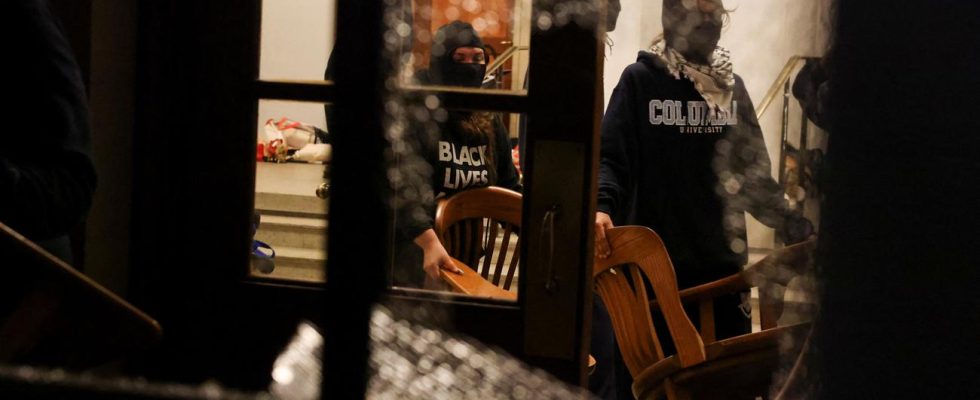Pro-Palestinian students at the renowned Columbia University in new York have occupied a building on the university campus. The reported, among other things, the New York Times. On the short message service X you can see numerous videos of students blocking a large house with human chains and sit-ins. According to US media, it is said to be Hamilton Hall, a neoclassical building on the Manhattan campus.
According to reports, the demonstrators left their protest camp shortly after midnight (local time) on Tuesday night. They then moved together to Hamilton Hall and occupied the building.
Negotiations between the demonstrators and the university management had previously been unsuccessful. The students missed a Monday afternoon deadline to clear their protest camp. The university then took action against the students. A university representative announced on Monday that the process of suspending students had begun. This is part of the next phase to ensure safety on campus.
University President Minouche Shafik announced on Monday that days of negotiations between the two sides had ended without any results. She appealed to the demonstrators to “voluntarily” vacate their camp – but the protesters did not comply with this for the time being. The deadline passed without any sign of the camp of 200 people disbanding.
A statement read by a student after the deadline spoke of fear-mongering. The protest participants would not leave until the university complied with their demands or they were forcibly removed.
Call for an investment stop
The university management had been negotiating with the demonstrators since Wednesday. A central issue of contention was the protesters’ demand that Columbia University divest itself of companies with ties to Israel have to separate.
In her statement on Monday, Shafik made it clear that the university had no intention of “withdrawing investments from Israel.” However, in the discussions, the university management offered to increase transparency about the investments made by the university and to examine student suggestions for “socially responsible investing” more quickly.
However, Shafik complained that many of the Jewish students had found the atmosphere at Columbia University in recent weeks “unbearable” and had therefore left the university. “Anti-Semitic language and actions are unacceptable and calls for violence are simply abhorrent,” said the university president.
Protests across the country
In mid-April, the university called the police to campus to take action against the protests. More than 100 people were arrested. The pro-Palestinian protests then spread to other colleges across the country.
Last weekend, police broke up protest camps at several US universities, sometimes using chemical irritants and Tasers. Around 275 protesters were arrested, including 100 at Northeastern University in Boston alone.
The government of US President Joe Biden called on protesters to refrain from violence. “We obviously respect the right to peaceful protests,” said National Security Council spokesman John Kirby on ABC News on Sunday. However, the government condemns anti-Semitic statements “as well as circulating hate speech and threats of violence.”
Questions about anti-Semitism
The organizers of the protests reject the accusation of anti-Semitism. They emphasize that the protests are against Israeli warfare Gaza Strip directed.
The war in the Gaza Strip was triggered by the major attack on Israel on October 7th by the radical Islamic Palestinian organization Hamas. According to Israeli information, 1,170 people were killed and around 250 others were taken hostage in the Gaza Strip.
Since then, Israel has been taking military action in the Palestinian territory. According to the Hamas-controlled Ministry of Health, which cannot be independently verified, more than 34,480 people have been killed so far.
Pro-Palestinian students at the renowned Columbia University in new York have occupied a building on the university campus. The reported, among other things, the New York Times. On the short message service X you can see numerous videos of students blocking a large house with human chains and sit-ins. According to US media, it is said to be Hamilton Hall, a neoclassical building on the Manhattan campus.
According to reports, the demonstrators left their protest camp shortly after midnight (local time) on Tuesday night. They then moved together to Hamilton Hall and occupied the building.

